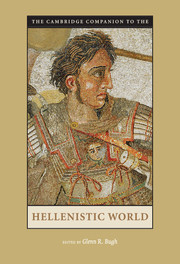Book contents
- Frontmatter
- Introduction
- 1 Alexander the Great and the Creation of the Hellenistic Age
- 2 The Hellenistic Kingdoms
- 3 The Polis and Federalism
- 4 Hellenistic Economies
- 5 The Hellenistic Family
- 6 History and Rhetoric
- 7 Material Culture
- 8 Hellenistic Art: Two Dozen Innovations
- 9 Language and Literature
- 10 Greek Religion: Continuity and Change in the Hellenistic Period
- 11 Philosophy for Life
- 12 Science, Medicine, and Technology
- 13 Hellenistic Military Developments
- 14 Greeks and Non-Greeks
- 15 Recent Trends and New Directions
- Hellenistic Dynasties
- Works Cited
- Index
12 - Science, Medicine, and Technology
Published online by Cambridge University Press: 28 November 2007
- Frontmatter
- Introduction
- 1 Alexander the Great and the Creation of the Hellenistic Age
- 2 The Hellenistic Kingdoms
- 3 The Polis and Federalism
- 4 Hellenistic Economies
- 5 The Hellenistic Family
- 6 History and Rhetoric
- 7 Material Culture
- 8 Hellenistic Art: Two Dozen Innovations
- 9 Language and Literature
- 10 Greek Religion: Continuity and Change in the Hellenistic Period
- 11 Philosophy for Life
- 12 Science, Medicine, and Technology
- 13 Hellenistic Military Developments
- 14 Greeks and Non-Greeks
- 15 Recent Trends and New Directions
- Hellenistic Dynasties
- Works Cited
- Index
Summary
Science, medicine, and technology seek knowledge to understand or control the natural world. This chapter draws together science and medicine, occupations primarily of the educated elite, with technology often practiced by slaves or foreigners. Some scholars bridged that gap, particularly those treating architecture, mechanics, poliorcetics, or medicine. A greater number of scientists and engineers, particularly ca. 320-200, accumulated more new knowledge than during any other three centuries of antiquity, and more scientific documents survive from this era than any other kind of writing. But, owing to disproportionately larger losses both of Hellenistic material and of works from all ancient eras on science, medicine, and technology, we consequently rely heavily on fragments quoted or paraphrased by writers in the first centuries of the Roman era.
The kingdoms of Alexander’s successors promoted science and engineering due both to governmental patronage and multicultural context. Warfare, trade, and prestige elicited or even demanded the growth of science and engineering. Greeks like Herodotos and Ktesias had admired the ancient civilizations of Egypt and Mesopotamia, and now elite members of the new Greek kingdoms - rulers, merchants, and scholars - found fresh material to contemplate and adapt in the ideas and practices of the conquered peoples.
- Type
- Chapter
- Information
- The Cambridge Companion to the Hellenistic World , pp. 241 - 264Publisher: Cambridge University PressPrint publication year: 2006
- 3
- Cited by

